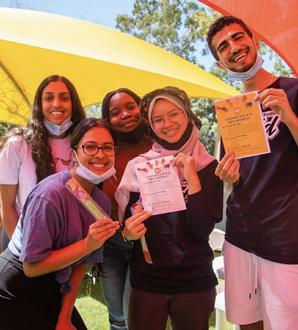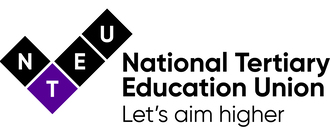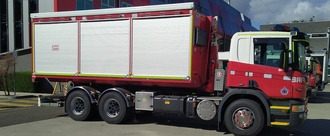- Featured
- Asylum Seekers and Migrants
- Climate and Environmental Justice
- Disability Justice
- Economic Justice
- Education
- First Nations Justice
- Health and Medicare
- International Solidarity
- LGBTIQA+ Rights
- Occupational Health and Safety
- Public Services
- Public Transport
- Racial Justice
- Social Justice
- Women's Rights
- Workers' Rights
- More
-
Regis nursing staff deserve fair wages and working conditions!Nursing staff at Regis Aged Care have expressed through recent rallies that management’s proposed Enterprise Agreement is an insult, and strips away many of our hard-fought working conditions. Regis nursing staff already get paid less than other providers, yet management’s proposed wage increases – just 1% for some, and 2% for others – are cuts in real wages of more than 3 to 4%, given the recent 5.1% increase in cost of living. Adding to this insult, management wants to cut so many of our working conditions and refuses to address understaffing and excessive workloads. We work so hard to care for our residents in extremely difficult circumstances. The least management can do is treat us with respect by providing fair wages and conditions. If management don’t significantly improve their offer, the majority of staff are likely to vote NO to the proposed Enterprise Agreement.542 of 600 SignaturesCreated by Queensland Nurses and Midwives' Union (QNMU)

-
Invest in Essential Workers: Grow the Workforce, Pay Rises, and Secure JobsWithout high quality schools, TAFEs, hospitals, transport and essential services our state will go backwards. But high quality services require good quality jobs and the NSW Government just isn't providing them. More buildings won't fix this. Ambulance ramping times are increasing, there are critical staff shortages across our health system and there is critical shortages of teachers, especially in STEM areas which Australia’s economic future relies on.3,897 of 4,000 SignaturesCreated by Unions NSW
-
Help Victorian unions open The CrossingIn Victoria, the largely unregulated private rehabilitation services mean that working people are often confronted with re-mortgaging their house, taking out loans, or withdrawing their superannuation to pay for services that can cost up to $30,000 per month. Victoria’s rehabilitation system is mostly inaccessible for working people, as most stays are between 3 months and 12 months. In Australia it takes an average of 20 years for a person to seek assistance for addiction due to shame and stigma and this is a trend that is appearing across all shop floors and all industries across the State It’s clear that the current system of treatment isn’t working and requires fresh ideas and methodologies for providing suitable treatment to working people and their families and funding models that work both for patients, employers and the government. We are proposing a tri-partisan collaboration with Odyssey House for a 28-day inpatient treatment facility funded and owned by the trade union movement after an initial investment from the Andrews’ Labor Government coupled with the establishment of an outreach and outpatient service, inclusive of toolbox talks for delegates, health and safety representatives, organisers and working people from all sectors with the support of trade unions, employers and the government. We need innovative, sophisticated solutions to complex issues such as addiction. We know that we have the most cost-effective, fit-for-purpose model for working Victorians to ease the burden on our already overcrowded healthcare system. Workplace support and early intervention are crucial in supporting workers combating addiction and mental health struggles. The opening of The Crossing will change the lives of workers struggling with addiction — as well as those of their families, their workmates, and their community.249 of 300 SignaturesCreated by HACSU & AMWU
-
Greater Protections For Migrant Workers!Wage theft and exploitation are facts of life for migrant workers. Many have to make the impossible decision of tolerating abuse or risk losing their visa, which results in many choosing to put up with exploitation to avoid deportation. Employers in Australia have far too much coercive power when dealing with migrant workers which allows abuse to occur. The Migrant Workers Centre has found that 53% of workers surveyed were forced to work overtime, whilst 27% confirmed they could not say no to unsafe work. These statistics are far higher than any other grouping of workers and this needs to change. The incoming Australian Government has a golden opportunity to address this as we welcome migrant workers back to Australia post COVID. Send them a message by signing that you too want greater protection and justice for migrant workers.3 of 100 SignaturesCreated by Corey Matthews
-
Reforming the temporary migration system in Australia.This petition is so important to me due to the fact as an Australian born here from grandparents who are migrants from Italy that all migrants arriving in Australia deserve to be treated with respect and dignity and due to the temporary migration system, we have in Australia now migrant workers’ rights being exploited and wage theft is rife. We have become a guest worker nation where the number of short-term visa holders in Australia reached 2.4 million before the COVID-19 pandemic and the number of temporary visa holders in Australia had shown a trend increase in recent years, in contrast to relatively stable permanent migration levels. We need urgent reform in the migration system to fix this and allow migrant workers to be safe and protected at work.2 of 100 SignaturesCreated by Joshua Hoye
-
Register your support for mural on railway bridge coming into Mordy!This mural will be important for recognition of the area and the people and places that shape/d it. It will also create a much lovelier feeling when driving on Nepean Highway and into Mordialloc.550 of 600 SignaturesCreated by Mordialloc Trader Association
-
Tasmanian Catholic Education Staff deserve better!The Agreement containing wages and conditions for teachers and support staff in Tasmanian Catholic Education expired last September. Following detailed member consultation the Independent Education Union sought to commence negotiations with the Tasmanian Catholic Education Office for our next Agreement in November 2021. Since then? Very little has happened. After months of delay the TCEO agreed to meet ONCE per month, ONLINE, for a maximum of TWO HOURS. When we offered to fly Melbourne-based members of our bargaining team to meet for detailed in-person negotiations, the TCEO refused on the grounds of COVID-safety, while their own employees in schools across the state continued to turn up in person to their high-contact workplaces every day. Meanwhile, the TCEO has outright rejected almost every claim made by the IEU, while seeking to reduce existing protections around hours of work. This is not good enough. It’s time to get serious. FIND OUT MORE: www.ieuvictas.org.au/tasmanian-catholic-education-bargaining-campaign824 of 1,000 SignaturesCreated by Independent Education Union Victoria Tasmania
-
Free Childcare for All!All parents are affected by this issue. Childcare fees are prohibitive for most families; mainly women and deter parents from being able to fulfil their employment needs and further their careers. This is a social equity and quality of life issue.6 of 100 SignaturesCreated by Diana Blyton
-
Safe Space for CaLD UWA Students!There is a high population of students from a variety of ethnic, migrant, and linguistic backgrounds who deserve a safe space to feel supported and welcomed in their time at UWA. Currently, UWA has 23,944 students enrolled and of those students, 46% were born outside of Australia and 25% of students spoke languages other than English at home. Experiences of racial discrimination are common among students of colour, however, many are overlooked and regarded as a 'slight comment' rather than an issue which deserves to be investigated. It is important for the plight of racial justice to extend beyond merely celebrating diversity. For an authentic sense of inclusion to be fostered, it is required of institutions to implement systems of support for CaLD students. The introduction of a safe space for the Ethnocultural Department would allow students of colour and all CaLD students the chance and space to discuss, dissect and reflect on their experiences by connecting with other students who face similar barriers and difficulties. This would also allow space for CaLD students to raise awareness among students and pointing them towards processes of resolve in the face of discrimination and utilise the UWA's complaint system that is currently existent, but not particularly accessible. Urging the need for an allocated room and therefore Ethnocultural safe space, is a necessity for UWA to be regarded as an inclusive campus for all. With the reactivation and reopening of campus, comes the obligation of the Guild President and Tenancy Chair to fast-track the bureaucratic process, and align the Ethnocultural safe space’s establishment with the increased return of students to campus. An Ethnocultural safe space would improve the campus experience for CaLD students by firstly cultivating a diverse and inclusive campus; but also filling the gaps that the University’s formal complaints processes are not able to address for CaLD students. Ultimately, a safe space would give students an outlet to express frustrations and anxieties of systemic and interpersonal racism, resulting in improved student well-being.242 of 300 SignaturesCreated by Adam Elyousef

-
Monash Must Pay for Student ConsultationsMonash University is one of Australia’s largest universities, with a reported surplus of $416 million in 2021. The University’s Strategic Goals say Monash will deliver “education of the highest international quality.” But Monash University cannot deliver high-quality education if it continues to erode the working conditions of its teaching staff. No staff member should be forced to decide between delivering a quality education to their students, and working without pay. We, the undersigned, petition Monash University Council to recognise that staff working conditions are student learning conditions, that consultation with students is vital pedagogical work, and that tutors must be paid for scheduled student consultation separately and in addition to the “rolled up” tutorial rate. Our demands are: - That the University backpays casual academic staff for student consultations conducted separately to tutorials, and the 2-hour minimum engagement where applicable; - That the University immediately directs all Faculties, Schools and Departments to pay Teaching Associates for all scheduled student consultation, rather than treating this consultation as ‘associated’ tutorial work; - That the University does not unfairly transfer this workload onto permanent academic staff; and - That Vice Chancellor Margaret Gardner issues a formal written apology to all affected staff. SIGNED: Ben Eltham, NTEU Monash Branch President Bernard Keo, NTEU Monash Branch Committee Giles Fielke, NTEU Monash Branch Committee Scott Robinson Kai Tanter Sofie Onorato, NTEU Monash Organiser Ishka De Silva, Monash Student Association (MSA) President485 of 500 SignaturesCreated by NTEU Monash Branch
-
Hands off ME leaveAnnual leave is an entitlement of employment, it's earned and it's ours. To link taking that leave to employee performance at the Bank is not appropriate or fair. ME have plenty of options if they want to ask staff to reduce the amount of leave they’ve got saved up - to make this a KPI is not fair. What staff do with their leave is their business, their ability to meet their performance goals should not be linked to getting their leave balance down!118 of 200 SignaturesCreated by Finance Sector Union
-
Emergency Services unable to safely rescue victims in Victorian Central Highlands RegionThere is currently very limited capability to safely perform Specialised Rescue. (this means Trench Rescue, confined space rescue and rope rescue) The rescue capabilities in the Ballarat region need to be addressed as a matter of urgency due to the fact that: • Emergency management in Victoria is unable to safely rescue victims in a timely manner • Firefighters and first responders are being exposed to a Workplace Health and Safety Risks, both physical and mental This has been an issue since at least 2014. Timeline: 2014 United Firefighters Union (UFU) notifies the Napthine Government and all MPs that there is an issue around insufficient specialised rescue capabilities, particularly in the Ballarat Region. Operations were carried out in an extremely ad hoc manner, with equipment (planks etc.) being purchased from hardware stores. There was two Provisional Improvement Notices (PIN) put on the Ballarat City trench rescue operation and WorkSafe got involved. In response, the CFA essentially got rid of their trench rescue operations entirely in Ballarat. They just took it off the list of capabilities, failing to solve the problem. 2018 On 21 March 2018 one man was killed and another seriously injured after a trench collapsed in Ballarat. Tragically the second worker died in hospital the following day. The two men, Charles Howkins and Jack Brownlee, were working constructing sewer at the site when the collapse occurred. 26 March 2018 (2 days later) The UFU sent a letter to the Minister for Emergency Services. The UFU received an email from the Minister acknowledging receipt of correspondence. Nothing further was ever communicated. July 2018 Trench Victim’s Families wrote to the Minister to bring the issue to their attention. 2022 Victim’s Families wrote to State Labour Government Ministers and MPs to inform them that there is still no specialised rescue capability in Ballarat. From 2014 to 2022 - The UFU and FRV Personnel have been raising concerns requesting resolution of this gap in capability. The problem has still not been resolved. Throughout this entire period, first responders have continued to attend to specialised rescues, but without the resourcing they need. It is quite simple what Ballarat needs: 1. Equipment An Appliance for Specialised rescue; there are 2 purpose-built units sitting in Melbourne. They were built 8 years ago and have never been deployed, they just sit around gathering dust. There is space at the Lucas Fire Station to permanently house one of these units. 2. Staff Enough trained firefighters to provide a specialised rescue team on all shifts. (10 Crew to cover all 4 shifts, and a reliever shift) 3. Training Ongoing specialised rescue training. 4. Mapping Mapping of local area resources to see if other agencies and organisations could assist with expertise, equipment and resources through MOUs.222 of 300 SignaturesCreated by Ballarat Regional Trades and Labour Council Incorporated



.png)

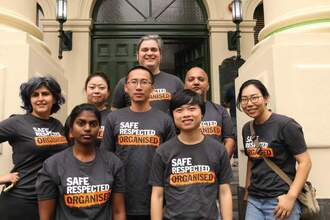

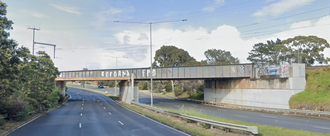
.png)

